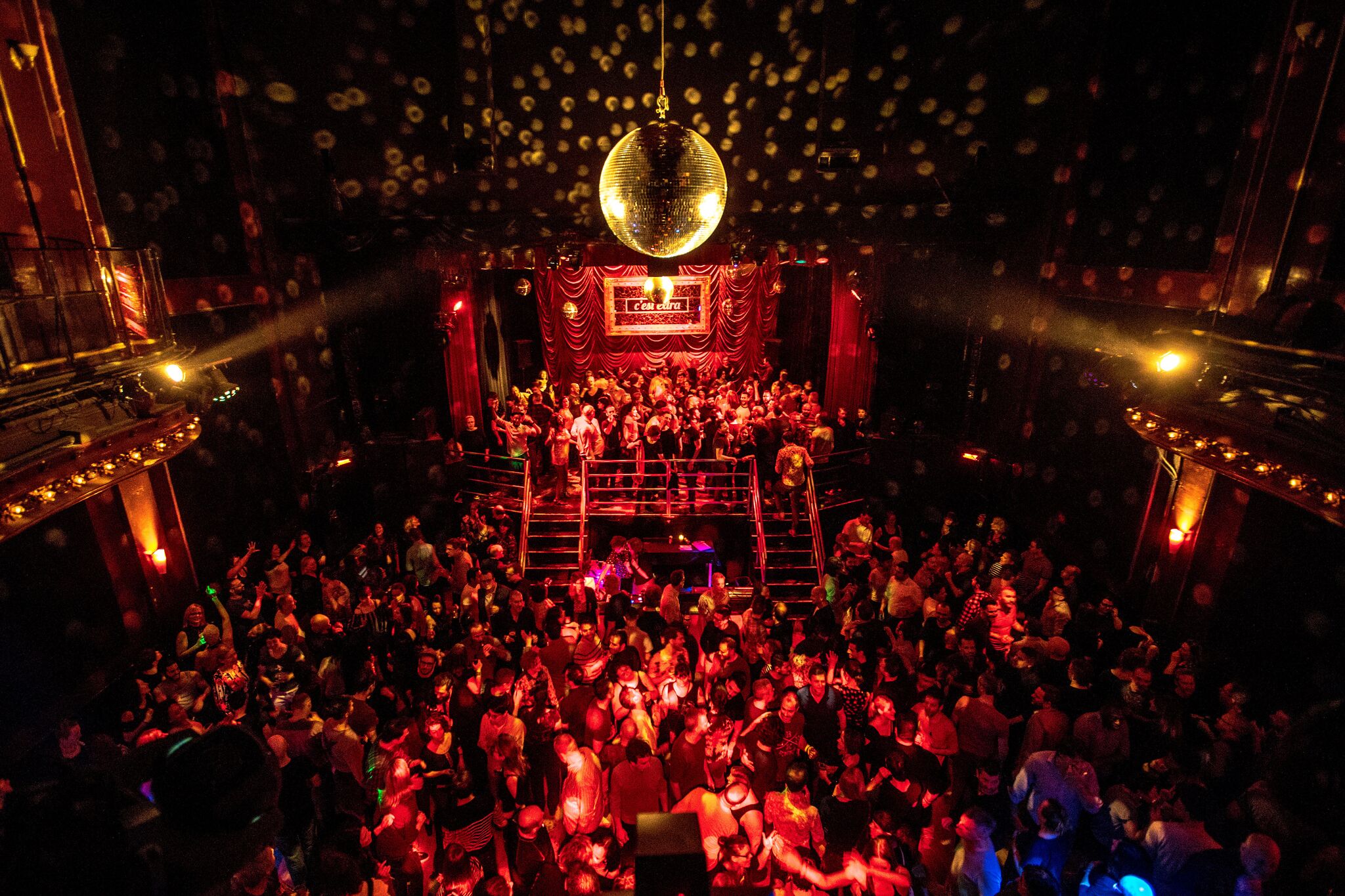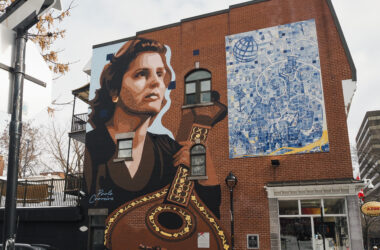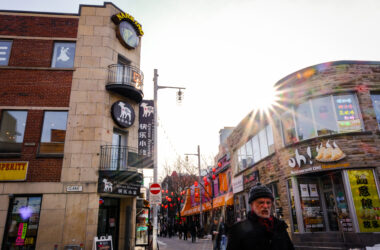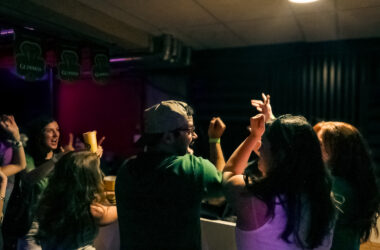Montreal’s party scene can be hard to navigate. For many McGill students, it often feels as though the only places to dance and have fun lie along a four-block strip of Saint-Laurent Boulevard. And while Tokyo and Apt. 200 have their merits, these spaces aren’t everyone’s cup of tea—nor are they particularly inclusive of a range of identities, demographics, and communities. Fortunately, beneath the pulse of the city’s mainstream nightlife lies a faction of underground dance parties that aim to offer something different.
Glitter Bomb is one such event. Hosted and organized once a month by Jeffrey Torgerson—known on stage as DJ Jeffany—and Kristopher Allnutt—known as DJ Awwful—the event was originally created as a small queer hangout at the popular bowling-alley bar Notre-Dame-des-Quilles. It has since grown into a popular queer pop dance party featuring drag performances at Mile End’s Bar Le “Ritz.”
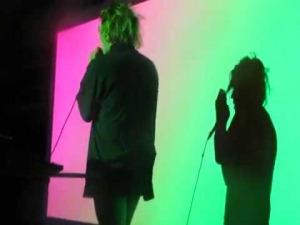
“Having a space for drag that’s not in the Gay Village is important,” Torgerson said. “There’s not a lot of places for drag [outside the Village]. A lot of the queens expressed that it’s important to have this queer spot that’s inclusive also to bio queens, queens who were assigned female at birth and identify as “biological women,” [….] Also, there’s a lot of disappointing transphobic ideas about drag and we want to make sure that our space is open to having performances from all backgrounds.”
Torgerson added that Glitter bomb aims to be an inclusive space where people can express themselves without putting their security at risk.
“It’s a queer dance party so it creates a space for queer people to come together, mingle, dance, and have fun,” Torgerson said. “But also, a space to dress up and be creative with your looks. “We just want you to come as yourself, have fun, and not be worried that you’re not safe in any way.”
Starting as a simple way to experience the nostalgia for the emo music of the 2000s, Emo Night Montreal, which takes place every fourth Friday, is another community-oriented event hidden in the city’s nightlife. Produced and hosted by Thierry Martineau—also known as DJ Sticks and Stones—the event started in Los Angeles in 2014 and—as it catered to a community that often couldn’t go out to enjoy their favourite music in clubs—became so popular that it was adapted in many other cities in North America, including Montreal. Martineau’s connections and personal interest in emo and pop punk along with his own thrilling experience in Toronto’s Emo Night, Homesick, led him to bring Emo Night to Montreal.
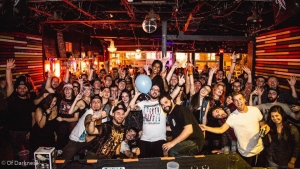
“I was in a pop punk band […] and Vendetta Productions had booked [our band] at TRH-Bar [in November 2016,]” Martineau said. “They had the venue until three and I [suggested] Emo Night in Montreal [….] We ended up selling out TRH-Bar, around 250 [people came]. So, we decided to do it again.”
As it became more popular, Emo Night eventually outgrew its original location of TRH-Bar. The organizers decided to move to Quartier-des-Spectacles’ Foufounes Electriques due to its reputation as a venue for alternative music, having hosted acts such as Nirvana and Nine Inch Nails.
Emo Night MTL strives to create space for those who seldom hear their music tastes played at clubs, and have become alienated from the mainstream club scene for this reason.
“[Emo Night is] a place to listen to songs that you sang in your bedroom […] and now can do with hundreds of people [who] know all of the lyrics,” Martineau said. “In general, people want a low-pressure, fun, kind-of cringy [event] where every song is [one] that [you’re] embarrassed to like […] Emo Night is a bit like that [where] you come in and you’re proud.”
In addition to catering to those hoping to reflect indulge in their favourite songs of the 2000s, Emo Night also welcomes lovers of today’s emo hits.
“There’s two brackets [of the emo subculture], the nostalgia ‘kids’ who are now adults, and there’s younger people who are in their [mid-20s] since pop-punk and emo [has had] a resurgence with newer bands such as State Champs and Neck Deep,” Martineau said. “[Emo Night] is meeting the needs of [both] types of people. Music-wise, we play more of the new stuff earlier in the night for the hardcores. Later on, we’ll play the [emo] hits of the 2000s that appeal to everybody.”
While many francophones in Montreal can argue that much of the Saint-Laurent club scene caters to anglophone culture, C’est Extra strives to provide them with a community. The dance party is hosted every Sunday before a holiday—such as Easter or Thanksgiving—and showcases the best francophone songs of the ‘60s and ‘70s. This celebration of retro French music was established in May 1996 by Marie-Christine Champagne, known as MC Champagne, and a few friends, and first took place at the Cabaret du Musée Juste pour Rire, which has since closed.
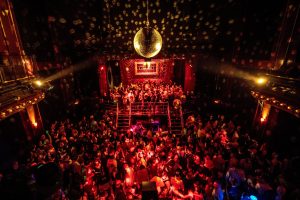
“I really like old vinyls and their songs,” Champagne said in an interview with La Presse. “We wanted to make an event where people came to listen [to French music]. We didn’t really think of dancing at the time, we were thinking of listening to French music […] of ‘50s, ‘60s, and ‘70s really loudly in the speakers […. at] the first event, 500 people came [….Everyone asked] ‘When’s the next one?.’ With much hype and by popular demand, we did it [again.]”*
This extraordinary event was held in the Cabaret Just For Laughs until 2006, when it moved to La Tulipe, a cabaret theatre situated in an 105-year-old building at Papineau and Mont-Royal. It has even led to a special edition every New Year’s Eve, which is hosted at the Place Ville Marie Observatory and broadcast for the whole city to dance to on radio station Ici Musique 100.7 FM. Still, the event has maintained its original purpose of playing classic and often-forgotten French songs.
C’est Extra works to bring together people with a common interest in French music. The event’s longevity has allowed organizers to build a community among attendees over several generations.
“Around one million people have come to dance at our nights in the [past] 22 years,” Champagne said. “First of all, we have people who have been following us for 22 years, [which] is already extraordinary. There’s those that have become parents who bring their children.”*
The approximately one million people all contribute to the event’s sense of unity.
“It’s always a pleasure to have this night […] with the people dancing and a lot of singing,” Champagne said. “We’re all together to create that moment […] a bunch of crazy beautiful people having so much fun. It’s a fusion of energy and craziness.”*
For Montrealers who don’t particularly enjoy or feel comfortable in a traditional club setting but still want to go out and dance their hearts out, keep in mind that there are plenty of dance party options to explore.
*Quote translated from French.
